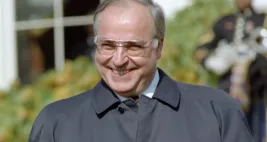January 17, 1991
The Chancellor's [Helmut Kohl's] Telephone Conversation with President Mitterrand on Thursday, 17 January 1991 at 5 pm
Neuer
Bonn, den 17. Januar 1991
V e r m e r k
Betr.: Telefongespräch des Bundeskanzlers mit Präsident Mitterrand am Donnerstag, dem 17. Januar 1991 um 17.00 Uhr[1]
Präsident Mitterrand beglückwünscht den Bundeskanzler zunächst zu seiner Wahl.
Der Bundeskanzler erkundigt sich nach den Informationen, die Präsident Mitterrand zur Lage am Golf habe.
Der Präsident gibt der Meinung Ausdruck, daß der Informationsstand wohl der gleiche sei. Man müsse sich jetzt jedoch vor Euphorie hüten. Der militärische Schlag sei bemerkenswert gut gelungen; es sei jedoch schwierig, zu diesem Zeitpunkt schon die Wirkungen genau einzuschätzen. Die USA wollten nun weiterkämpfen, solange wie nötig. Er wäre überrascht, wenn die USA in kurzer Zeit ihre Absicht ändern. Er treffe jeden Tag mit französischen Kommandeuren zusammen, um sich informieren zu lassen. Die Kriegsmaschine funktioniere bemerkenswert gut. Vier französische Flugzeuge seien getroffen; jedoch keines abgeschossen worden. Die Briten hätten ein Flugzeug verloren. Seiner Auffassung nach müsse man weiterkämpfen, bis Saddam Hussein oder eine neue Regierung des Irak um Gnade bitte. Dann solle man die Chance ergreifen und den Kampf einstellen. Jetzt werde es eine Schlacht um Kuwait geben. Die Alliierten hätten nicht die Absicht, sich in Erdkämpfe einzulassen, ehe die Luftherrschaft voll errungen sei. Jedenfalls seien die ersten Ergebnisse besser als erwartet. Wenn es so weitergehe, könne man in einer Woche zum Waffenstillstand kommen.
Der Bundeskanzler erkundigt sich nach dem Eindruck des Präsidenten von der Zuverlässigkeit der Informationen betreffend die Kampffähigkeit der irakischen Luftwaffe.
Der Präsident meint, die irakische Luftwaffe sei außer Gefecht gesetzt. Alle Flugzeuge der Alliierten, die getroffen worden seien, seien von der Flugabwehr getroffen. Die irakische Luftwaffe habe wohl keine großen Reserven mehr.
Der Bundeskanzler schlägt vor, morgen um 13.00 Uhr wieder zu telefonieren.
Der Präsident erklärt sich einverstanden.
[1] BArch, B 136/59734, 234-235.
Neuer
Bonn, 17 January 1991
M e m o r a n d u m
Subject: The Chancellor's Telephone Conversation with President Mitterrand on Thursday, 17 January 1991 at 5 pm
First, President Mitterrand congratulates the Chancellor on his election.
The Chancellor [Helmut Kohl] queries about the information that President Mitterrand had on the situation in the Gulf.
The President says that the information level was probably the same. However, one had to be beware of euphoria. The military strike had succeeded remarkably well. However, it was difficult to precisely assess the effects at this point. The US wanted to keep fighting for as long as necessary. He would be surprised if the US changed its mind in a short period of time. He meets with French commanders every day to get information. The war machine worked remarkably well.
Four French planes had been hit, but none had been shot down. The British had lost an airplane. In his view, the fighting had to continue until Saddam Hussein or a new Iraqi government asked for mercy. Then one should seize the chance and stop the war. Now there would be a battle for Kuwait. The allies had no intention of engaging in ground combat before air supremacy was fully achieved. In any case, the initial results were better than expected. If it went on like this, a ceasefire could be reached in a week.
The Chancellor asks about the President's impression of the reliability of the information regarding the combat capability of the Iraqi Air Force.
The President says that the Iraqi Air Force had been incapacitated. All allied aircraft that had been hit were hit by air defense. The Iraqi Air Force seemed to have run out of reserves.
The Chancellor suggests calling again tomorrow at 1:00 p.m.
The President agrees.
Kohl and Mitterrand talk about the start of allied military operations in the Gulf War and France's contribution in particular.
Author(s):
Associated Topics
Associated People & Organizations
Subjects Discussed
Document Contributors
Document Information
Source
Original Archive
Rights
The History and Public Policy Program welcomes reuse of Digital Archive materials for research and educational purposes. Some documents may be subject to copyright, which is retained by the rights holders in accordance with US and international copyright laws. When possible, rights holders have been contacted for permission to reproduce their materials.
To enquire about this document's rights status or request permission for commercial use, please contact the History and Public Policy Program at HAPP@wilsoncenter.org.
